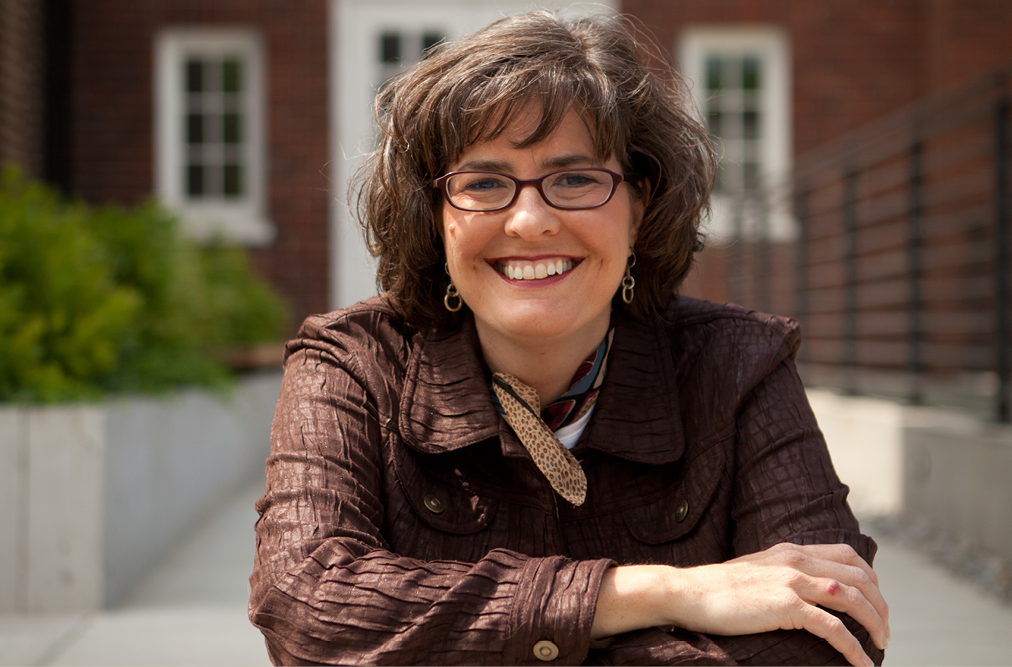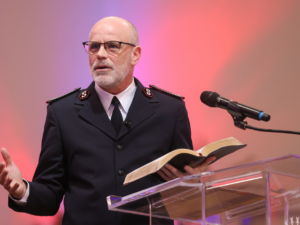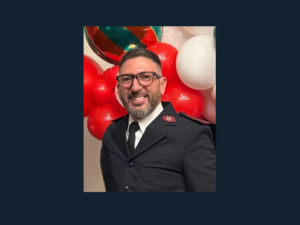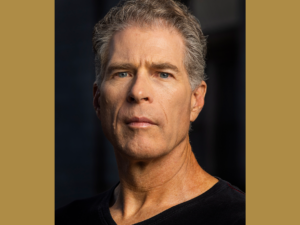How do we seek the peace and prosperity—the shalom—of our communities?
It’s a charge from God as we find in Jeremiah 29:7: “Seek the peace and prosperity of the city to which I have carried you into exile. Pray to the Lord for it, because if it prospers, you too will prosper.”
So how do we love our neighbors and work for the common good?
Dr. Amy Sherman lays it all out in her new book, “Agents of Flourishing: Pursuing Shalom in Every Corner of Society.” It’s part theological reflection and part instruction manual on how to be, as she calls it, a “kingdom foretaste bringer.”
Dr. Sherman directs the Sagamore Institute’s Center on Faith in Communities, a capacity-building initiative for congregations and faith-based and community-based organizations. Its aim is to help leaders invest more strategically and effectively in their communities as they address poverty and injustice.
She also works closely with Made to Flourish, a pastors’ network for the common good focused on issues of faith and work. She’s the author of seven books and more than 100 articles and essays, and frequently speaks and trains congregational and nonprofit ministry leaders.
Dr. Sherman holds a Ph.D. in international economic development from the University of Virginia and volunteered for several years as a Senior Fellow with the International Justice Mission.
She’s on the show today to help us better understand the concept of biblical flourishing and how we can effectively seek it in our communities.
Show highlights include:
- More of Dr. Amy Sherman’s story.
- What biblical flourishing is.
- Whether biblical flourishing is possible here on earth.
- Dr. Sherman’s thoughts on if the Church in America today is in exile.
- Why it grieves her that today’s Christ followers are often known more for what we’re against than what we’re for.
- How to effectively engage this world.
- The biblical vision to seek the shalom of the community.
- The “human Ecology Framework” and why she based the book’s framework around it.
- What the Church has contributed to the Good, the realm of social mores and ethics.
- A strategy for cultivating the good now.
- An example of Christ-followers who have embodied with courage and grace the idea that “Christianity weds doctrinal convictions with social responsibility.”
- How to get started pursuing shalom today.
Listen and subscribe to the Do Gooders Podcast now. Below is a transcript of the episode, edited for readability. For more information on the people and ideas in the episode, see the links at the bottom of this post.
* * *
Christin Thieme: Dr. Sherman, welcome to the Do Gooders Podcast. Thanks so much for joining me today.
Amy Sherman: Thank you so much for inviting me.
Christin Thieme: Can you tell us here at the start just a little bit, an overview, of what’s your story? I know that’s a big question, but maybe some of the highlights that brought you to today.
Amy Sherman: Yeah, sure. So I’ve been involved in the work of Christian community development for most of my adult life. So I’ve been very interested in and engaged in questions around how, as Christ’s hands and feet in the world, we can effectively and faithfully go about doing the work of justice and mercy in our communities. And it’s been something that I think the Lord put a heart for the poor and for the Church’s role in engagement and coming alongside people who are vulnerable and seeking to empower them and kind of unleash their creativities.
He put that desire in my heart, really as a teenager. So I’m one of these really fortunate people who has had a pretty strong sense of vocational calling for a long time, and it really hasn’t changed that much. It’s been a pretty singular kind of a journey. So these days I am mostly a capacity builder. So I come alongside of churches and faith-based ministries that are seeking to promote greater mercy and justice in their communities, and try to help them do what they do better. So I like to call myself a minister to ministries.
Christin Thieme: That sounds like a fun job.
Amy Sherman: It’s a great job. And I get to see a lot of what God is doing through his people all around the country, and that’s just incredibly encouraging.
Christin Thieme: Yeah, absolutely. And you’ve packaged some of that up for us. You’ve written a new book. It’s called “Agents Of Flourishing: Pursuing Shalom In Every Corner Of Society.” Can you tell us a little bit more about it?
Amy Sherman: Yeah. This is a book that essentially tries to unpack a pretty familiar text in Scripture. It’s Jeremiah 29, verse seven, where God is calling the faithful Israelites who are in exile in Babylon. And he tells them to “seek the peace and prosperity of the city in which they have been sent.” And that idea of peace and prosperity is really a pickup of the Hebrew concept of shalom, and so it’s a pretty amazing charge that God is giving to his people in that situation because they’re away from their homeland. They’re in exile. They’re in this very painful and difficult place. And yet God is encouraging them to essentially love their neighbors and work for the common good. And this verse, Jeremiah 29:7, is something that I feel like I see being picked up a lot more by Christian leaders and ministries over the past several years.
There’s just been so many times I’ve heard a reference to that particular Scripture. And I love that. I love that people are talking more about, well, what does it mean to be a church for our community? And what does it mean, as Christians, to seek the common good, or to seek the good of our neighbors, to seek the peace and prosperity of our city? And so this is a book that tries to offer some theological reflection about that, and also tries to tell lots and lots of stories, both from Church history and from contemporary churches about what that work actually looks like when it’s enacted. So I hope that the book will be both instructional, but also inspirational.
Christin Thieme: When you say agents of flourishing, maybe you can give us a little bit of some insight into this core concept of what is exactly biblical flourishing?
Amy Sherman: Yeah. Yeah. Great question. So couple things to say there. One is that I think you can really use the term flourishing and the word shalom kind of interchangeably, because true biblical flourishing basically means things being the way that God wants them to be, things being the way that God means them to be. In other words, we’re talking about God’s normative intentions. And in the Bible, this idea of shalom, this right relationship between human beings and God, between human beings and other human beings, between human beings and the created order, and in an individual, sort of the human being’s own peace with their own soul. Those four dimensions of peace and prospering is kind of what the Hebrew term shalom is getting at.
And so the idea of biblical flourishing is that we would be flourishing in all of those dimensions, that we’d be spiritually flourishing, and socially flourishing, and psychologically flourishing, and physically or materially flourishing. So that’s the first thing I think we can say about biblical flourishing, is that essentially it’s about what God says this is the way I want things to be and this is the life I have for you. This is what I created you for.
The other thing we can say, though, is that this biblical view of flourishing is counter-cultural in some important ways, right? Because today a lot of, I think, what we think about in the term flourishing is a very Western or American idea of individual prosperity or individual freedom, or lots of self expression. And, you know, those things are important, but this definition of shalom that I was just sharing shows you how much more about relationship and community true flourishing is, right? It’s not this lone ranger concept.
So yeah, I think those are some of the dimensions of true flourishing. It’s about communion with God. And it’s about real harmony and peace and living in unity in the midst of diversity with other people. And it’s about wholeness and health being in right relationship with the created order. And it’s about mental flourishing. It’s about having the freedom and the great joy of using the intellect that God has given us for the purposes of learning and discovery. So it’s a very robust concept that we see in this idea of flourishing.
Christin Thieme: Do you think it’s meant to be our goal here on earth? I mean, is it possible, or does it require perfection? Is it something that we can reach here while we’re here on earth?
Amy Sherman: No, I don’t think so. I think that the way that we should understand it is that in the beginning, in the creation, God created a world of this perfect flourishing, and said it was very good, right? So we see that true shalom in Genesis 1 and 2. But then in Genesis 3, of course, human beings disobey, and they turn away from God. They wanted themselves to be the king instead of having God be the king. And this plunges the world into great corruption and ruin and brokenness. And so things are not the way that they are supposed to be, and therefore in a broken world, we don’t experience the shalom that God intended for us.
But in his great mercy, God didn’t leave us in that state. He sends Jesus into the world to be the one through whom the restoration of that flourishing of shalom is made possible. And so Jesus comes in and fully experiences all the brokenness of this world, and takes that upon himself, and is made sin for us and deals with all that sin and guilt and corruption, and then triumphs over all of it. Triumphs over it in the resurrection. And then promises that this new world order, this new creation that he has begun, this idea of the kingdom of God that he has launched through his ministry, and that is here in a very real way, but is not yet complete. He promises that he will come back and bring that to fulfillment.
So we live in this interesting time in the now and the not yet where more flourishing is possible because of the reality that Jesus’ kingdom has broken into our time and space. And so on the one hand, we can be very excited and very optimistic and idealistic, so to speak, and go after pushing the envelope and seeking greatest degree of shalom for our neighbors that we possibly can. But yet not be utopians to think that we could build it on the base of our own human actions. Perfect shalom’s not going to come until Jesus returns.
Christin Thieme: Yeah. An important distinction.
Amy Sherman: Yeah.
Christin Thieme: You’ve said that it grieves you today, that Christ’s followers are often known more for what we are against than what we’re for. So what does it mean to be a faithful presence in our communities today?
Amy Sherman: Well, I think it’s really about being missional people and being missional churches. I like that word because it connects us back to God’s purposes in the world. It connects us back to the whole doctrine of the Missio Dei, the notion that God is on a mission, that God has a mission. And we’ve kind of already been talking about it because we’ve already outlined that biblical storyline from creation, through the fall, through redemption, and then looking forward to new creation, or the restoration of all things.
And that really is a picture of this idea of the Missio Dei, that God is on this mission to renew all things, to set all things right, to bring the kingdom of God in ever greater fullness, and then to consummate that kingdom with the return of Jesus. So God is on this mission to make all things new, and we are invited by God to participate with him in that mission. Right?
So we need to be for the things that God is for. And God is for renewed communities. God is for a world in which more and more of the realities of the kingdom of God become present in the lives of our neighbors here on earth. That’s why Jesus told us to pray, “Your kingdom come on earth as it is in heaven.” So I think what kind of the big point of why we’re here and the big point of Christian mission is to join God in this amazing and comprehensive mission of bringing renewal to all things, bringing foretastes of the coming kingdom.
Christin Thieme: And as we become agents of flourishing in that, your book is, as you said, part instructional, part inspirational. And you’ve organized it around something called the “human ecology framework.” Can you explain a little bit more about what that means and how that translates in the book?
Amy Sherman: Yeah. So one of the things that I was concerned about in writing the book is that even though I think there’s an increasing desire to live into this amazing call of Jeremiah 29:7, and seeking the shalom of the city, we don’t necessarily kind of come up with strategies that are aligned with the comprehensiveness of that vision. And so I’ve seen things where folks will talk about, yeah, we’re living into Jeremiah 29:7 and how we do that is on this particular Sunday, we shut the church down and everybody goes out and we do all these service projects all around the city. And that’s not a bad thing. That’s a good thing. But it’s a very incomplete enactment of this really very robust and sophisticated and comprehensive vision.
So the human ecology framework was something developed by some friends of mine at the Thriving Cities Group. And essentially they were trying to answer the question, how do cities thrive? How do we get to a thriving city? And they said, well, cities thrive when they are strong and flourishing in six different realms, and they call those six realms community endowments. They’re like arenas of our shared civilizational life.
And the six endowments are the good, the true, the beautiful, the just and well-ordered, the sustainable, and the prosperous. Each of those depicts a different sort of realm of life. So the good is the realm of social mores and social ethics. And the beautiful is the realm of aesthetics and design. And the true is the realm of human knowledge and learning. And the just and well-ordered is the civic life and the political life’s dimension. The sustainable is the dimension of human and natural health. And the prosperous is the dimension of the economy.
And when I was looking for a way to talk in the book about biblical flourishing, and how we promote that as individuals and as congregations, I was just really struck by the alignment that I saw between what I call the marks of biblical flourishing. And we’ve talked about some of those things, communing with God, and beauty, and learning and discovery, and health and wholeness. And those things, those marks of biblical flourishing really map on very well to this idea of the six community endowments.
And so in the book I try to answer the question, how do we seek the shalom of our city? I’ve tried to answer it by saying, well, we do that by seeking the shalom in each of those six arenas of our life together. And in each of those community endowments, I try to give some theological insights as to what God’s normative intentions are for that realm of life, and then give some examples of the ways that the Church has contributed to the strengthening of that realm of life, or of that community endowment, both in the past and in the present.
Christin Thieme: Yeah. I love the framework breakdown. It makes it much more digestible.
Amy Sherman: Right.
Christin Thieme: Can you maybe give us a little taste of one of these arenas, maybe starting with the good, that was the first one in your book. What has the Church contributed to social mores and ethics in our society, and what can we do now as a strategy for cultivating the good?
Amy Sherman: Yeah. Yeah. So usually for each of these arenas, I was trying to reflect on both the contributions that the Church makes in terms of thought leadership. So what ideas and principles or concepts do we bring about how to pursue flourishing in that endowment, or what it’s shaped by? And then also looking at the implementation of actions and practices. What has the Church actually done?
So in the realm of the good, as an example, we see this wonderful interplay between sort of thought leadership and practical action when we think about the early Church. So in the New Testament, we see this huge principle of agape love, this notion that this is the kind of love that Jesus came and shared with us, this self-giving love that seeks the good of the other. And then Jesus is saying as I have loved you, so love each other. And so love your neighbor.
And so out of that idea of agape love, you see the early Church translating that into sort of new ways, new countercultural ways of thinking about really big dimensions of life together. Like, how do we negotiate money? How do we think about sex? How do we think about power? How do we think about the idea of the tribe? Right? And so we see the early Church, instead of pursuing greed and winner-take-all, they’re self-sacrificing financially for one another, holding things in common and being radically generous to the poor. They’re giving away their money. They’re not hoarding their money. And in contrast to the sexual ethics of the day in the Roman culture, where men were pretty much free to do whatever they want, instead you have this incredible strong teaching about sexual mores and a practice where sex is only in the context of the marriage relationship, and against the idea of tribe there was very much this sense of who’s in, and who’s out.
Instead, the Church is going out on the margins and bringing in the excluded, and including the excluded and not being so tribally focused. And so you see this interplay of new ways of thinking about things and new ways of doing things. And so the Church ends up doing these amazing works of standing up for the sanctity of life, saying in the realm of the good, hey, every person is made in the image of God and all of our social ethics have to be based on this fundamental understanding that every single person has this inherent human dignity that has to be respected.
And that’s why they saved the babies that people were wanting to abort. It’s the reason why they lobbied for the Roman Empire not to brand the faces of criminals, the way that animals are branded. It’s why they oppose the gladiatorial games of the early centuries, because they have this notion that the Imago Dei matters. And it matters even for prisoners, even for these people that you see as less than human. They are not less than human. And they elevated the status of women. They elevated the status of widows. They defended the rights of widows in the context of a society that said, no, women are second class citizens. So we see the way that the Church has done that.
And then in the book, what I do is talk about a really neat initiative down in Florida that took place some years ago, whereby a whole bunch of churches got together to do a lot of different creative programs and outreach to basically try to strengthen marriage in Jacksonville, Florida. It was a sort of a countywide initiative that went on for a few years. And the idea was we really want to strengthen marriage and families. We want to try to cut the divorce rate and we want to help couples to have strong marriage relationships.
And so these 50 some churches came together in a whole different variety of ways, whether it’s premarital counseling, or crisis intervention weekends. And they were amazingly successful through that collaborative effort. They were able to really move the needle on decreasing the divorce rate in that county. So that was an example of, I think, a contemporary story of the Church really contributing to this idea of strengthening the good.
Christin Thieme: Yeah. I love how you include those examples throughout the book of the Church today, how they’re implementing these things and trying to make a difference and cultivating the good, like you said. You wrote at one point that “Christianity weds doctrinal convictions with social responsibility.” And I think that’s such a perfect way to look at it and see all these examples of people doing just that. I love it.
Amy Sherman: Yeah.
Christin Thieme: So what would be your best encouragement or some sort of tangible piece of advice for somebody who’s listening and who really wants to get started with pursuing shalom today? I mean, step one is to get the book and read it, but what’s your next best piece of encouragement?
Amy Sherman: Well, I like to talk to people about the vision of being a kingdom foretaste bringer. So we said that shalom was what marked the original creation, and shalom, perfect shalom, is where everything is going. Right? So the future kingdom, when we’re all living together in the new heavens and the new earth, we are going to be experiencing to the full this idea of shalom. And it incorporates in itself these ideas of perfect justice, and perfect wholeness, and perfect peace and harmony, and perfect abundance and sufficiency for all.
And so if that’s where all of redemptive history is going, if that’s what Jesus is up to, he’s bringing that kingdom. Then how do we become people who bring little foretastes of that into our sphere of influence? And I like to encourage people to really think about it as it relates to their work, because we spend so much time at work and doing work. So what does it look like for me to bring a little foretaste of justice, or a little foretaste of greater peace or unity or harmony, or a greater foretaste of wholeness or of joy or of beauty? How could I do that? How could I bring those little foretastes to my coworkers, to the people with whom I interact, maybe customers or suppliers? How can I be a kingdom foretaste bringer? And I think that gives us wide scope for creative action.
Christin Thieme: I love it. Well, Dr. Sherman, thank you so much. Thanks for sharing with us and giving us these ideas on how we can better pursue shalom today.
Amy Sherman: It’s been my pleasure. Thank you.
Additional resources:
- Read “Agents of Flourishing: Pursuing Shalom in Every Corner of Society” (IVP, 2022) by Dr. Amy Sherman.
- Find support from moms who are right there with you. Join the Caring Moms Collective and find a place of low-pressure, high-encouragement love anytime you need it, whether you know it or not. Get in the group today.
- Get inside the Caring Magazine Scripture Study Collection and find a suite of free, downloadable Bible studies to guide you through topics from New Beginnings Through Forgiveness, to Understanding our Imago Dei or Life Hacks From David.
Listen and subscribe to the Do Gooders Podcast now.












